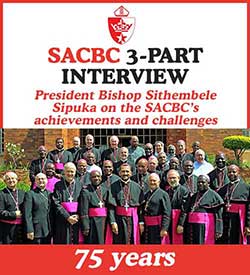Church and Judaism
The history of persecution of Jews in the name of the Catholic Church is a most distressing chapter in our history.
Popes created the first ghettos, and over almost two millennia much Christian preaching, including that by Catholics, fertilised the fields on which the poisonous fruits of pogroms and ultimately the Holocaust would be harvested.
We may never forget that awful history. The Second Vatican Council in its document Nostra Aetate took a huge step in acknowledging that guilt and in healing the deep wounds, a process that continues today. In 2000, Pope John Paul II most unequivocally apologised to the Jewish people for the injustices perpetrated by Catholics against their ancestors�many of them recent.
The Synod of Bishops for the Middle East in October emphatically reasserted the Catholic condemnation of anti-Semitism and anti-Judaism, acclaimed the Church�s desire of dialogue with Judaism, and affirmed the right of the state of Israel to exist at peace within its internationally recognised borders.
However, the synod also condemned injustices suffered by people at the hands of Israel. It pointed, among others, to illegal Israeli settlements in the West Bank, forced removals, and the so-called security wall and checkpoints which disempower Palestinians (including most of the region�s Christians) economically, socially and arguably politically.
The synod also acknowledged the iniquitous acts committed by Palestinians, but clearly there is no equivalence in the weight of these acts, or in the respective positions of power.
The Israeli reaction to the synod�s criticism�and a slice of controversial theology by an individual bishop�has been robust. Deputy foreign minister Danny Ayalon accused the synod of bishops of being �a forum for political attacks against Israel, in the best tradition of Arab propaganda�.
Rabbi David Rosen, international director of interreligious affairs for the American Jewish Committee�who from his time as rabbi in South Africa remembers the cruelty of apartheid and surely recognises the semblance of that in the Middle East conflict�bemoaned that the bishops �chose to make the Israeli-Palestinian conflict their first focus�, as if the trespasses of others serve as a mitigation.
These criticisms are wide off the mark.
Because of the tragic history of anti-Semitism, the Catholic Church�s relationship with Judaism must be grounded in humility and sensitivity. But it must not be predicated on keeping silent about injustices perpetrated by the state of Israel, less so when these injustices are visited upon Christians, as they are every day.
Let it be clearly understood: criticism of Israel is not intrinsically anti-Semitic. Indeed, the Church�s criticism flows from a deep desire to see all people of the Holy Land live as neighbours in peace�an aspiration shared by all people of good will.
But, one may ask, what is the nature of a relationship that is put in question when the Catholic Church exercises its teachings on justice and peace? Where is the equilibrium in a relationship in which only one partner is consistent in showing humility?
The Church must speak out against injustices where she sees them, even and especially when these injustices are perpetrated by valued friends.
Pope Pius XII is widely criticised for not having spoken out against the terror perpetrated by Nazi Germany and its allies against Europe�s Jews. Today, the Church is not being silent in the face of injustices perpetrated against the Palestinians in the Holy Land.
The experience of Pius XII has taught the Church, thanks in great part to the reproach of Jews, that silence is not an option.
It is our hope that more Jewish leaders will review the unjust actions of successive Israeli governments, and judge these through the objective values of justice which they demand for themselves, and become true agents for peace.
- The Look of Christ - May 24, 2022
- Putting Down a Sleeping Toddler at Communion? - March 30, 2022
- To See Our Good News - March 23, 2022









